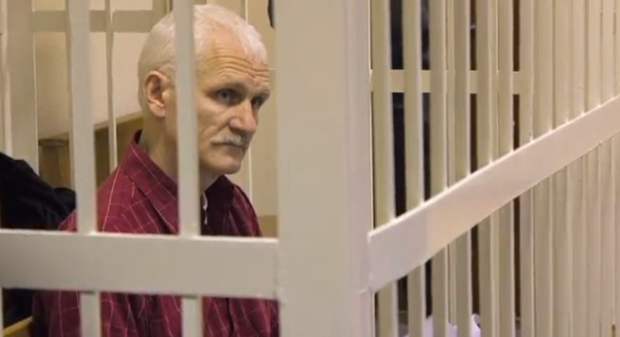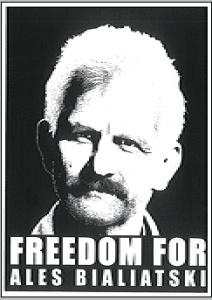Index relies entirely on the support of donors and readers to do its work.
Help us keep amplifying censored voices today.

Ales Bialiatski has been imprisoned in Belarus since 2011 (Image: AmnistieWeb/YouTube)
Belarusian president Alexander Lukashenko has said in a press conference in Minsk today that human rights defender Ales Bialiatski could be released from prison soon. This came in response to Ales Lipay, editor of BelaPAN news agency, asking about the possibility of amnesty for Bialaitsky, who has been imprisoned since 2011. He is accused of evading taxes on 90,000 US dollars.
“That damage was repaid to the state long ago with citizens’ donations; there were cases in Belarus when business people who faced economic charges were released after repaying much bigger sums. In neighbouring Russia, President Putin released Mikhail Khodorkovsky who was charged with causing the state damage of 500 million US dollars,” Lipay suggested in his question.
“This is a serious argument,” Lukashenko replied. “This has nothing to do with politics or Biliatski’s views. I swear I have never known him personally […], but taxes are a sacred thing.”
According to Lukashenko, if the information about the damage allegedly caused by Bialiatski being repaid is true, amnesty can be considered. He also suggested other political prisoners, like former presidential candidate Mikalay Statkevich, can be released if they apply with a relevant plea for a presidential pardon.
“Lukashenko’s statement shows he thinks about the issue of political prisoners; he definitely aims at solving this problem without any damage to his image as a strong leader,” Tatsiana Raviaka, Bialiatsky’s colleague at the Human Rights Centre Viasna, told Index. “The reason Lukashenko might want to solve it now is reputational as well, because Belarus is hosting the Ice Hockey World Championship in 2014, and looks into ‘clearing’ its record on political prisoners.”
Raviaka says there could be a slight “warming” of the overall human rights situation in Belarus as the authorities tend to “play the liberalisation game a couple of years before the presidential elections.”
“That was the case in 2008, before the severe clampdown came in late 2010; now we can face the same period of relative easing of the situation before the 2015 campaign. I think the firm position of the EU on the release of political prisoners as a pre-condition for any dialogue with the Belarusian authorities has also played its role. Besides, I am sure Lukashenko is following the developments in Ukraine, and he sees that further ‘tightening the screws’ can lead to serious protests,” she adds.
According to Raviaka, it is possible Bialiatski could be released, as “it is entirely the issue of political will”.
Ales Bialiatski is the chair of the Human Rights Centre Viasna, and a vice president of the International Federation for Human Rights. He was arrested on 4 August 2011 and later sentenced to four-and-a-half years in prison. Despite charges of tax evasion, the country’s civil society and the international community see his prison sentence as punishment for his principled stance in support of human rights in Belarus.
This article was posted on 21 January 2014 at indexoncensorship.org
 The founder of one of Belarus’ leading human rights organisations has been sentenced to four and a half years in prison for alleged tax evasion.
The founder of one of Belarus’ leading human rights organisations has been sentenced to four and a half years in prison for alleged tax evasion.
Index calls on the UK Foreign Office to press for Ales Bialiatski’s freedom
(more…)

Ales Bialiatski was released from detention. (Photo: Andrei Aliaksandrau for Index on Censorship)
Ales Bialiatski, a Belarusian human rights defender, was released from prison on Saturday after almost three years behind bars on politically motivated charges.
“My release came as a surprise. I was not expecting anything like that. There was a usual routine check in the morning and they took me to work with other prisoners. But around 9 a.m. I was summoned to the prison director’s office, where they told me I am being released due to an amnesty,” Bialiatski said during the press conference in Minsk today.
Bialiatski, the chair of the Human Rights Centre Viasna and a vice president of the International Federation for Human Rights (FIDH), was arrested on 11 August 2011 in Minsk and later sentenced to 4.5 years in prison for alleged tax evasion. He did not admit guilt and stated the funds in his bank accounts abroad were in fact spent for activities of Viasna and supporting victims of human rights abuses in Belarus.
“I am not sorry for those three years I spent in prison. This is the price you pay for making Belarus a free and democratic country. If we want to improve our life and drag Belarus out of the swamp it has been in for 20 years already, we need to be active and not to be afraid of repressions civil society faces. I knew what I was in prison for, that is why it was easy for me emotionally,” Bialiatski said.
In fact, it was not always easy. “Political prisoners in Belarusian jails are kept in different conditions than other prisoners. For instance, no one was allowed to talk to me, even if it was a friendly chat about weather or football, a person who approached me could be punished by the prison authorities. That was just one of many examples of physiological pressure political prisoners face in jail,” he said, describing his time behind bars.
He symbolically crossed his name out of the list of Belarusian political prisoners on a campaigning T-shirt his colleagues wore while he was in jail.
“So, Bialiatski is out, but seven more are still there. Belarus has to become a country without political prisoners. I demand from the authorities to release all political prisoners and stop prosecuting people for their political views,” Bialiatski said.
Bialiatski expressed his gratitude to “tens of thousands of people” from Belarus and around the world who supported him during his time in prison and campaigned for his release. Bialiatski also said he is not going to leave the country and he is determined to continue his human rights work.
There will certainly be ground for that as Belarus continues to have a poor human rights record. Most commentators inside the country do not see Bialiatski’s release as a sign of any genuine improvement of the human rights situation, but merely a step of “good will” that can ensure possible renewal of a dialogue with the European Union.
“The EU is clearly looking for ways and platforms for a dialogue with Belarus. Europe certainly wants to decrease tensions in the region and stabilize the situation that was created because of Ukraine and its conflict with Russia. And it can be strategically important for the EU not to allow Belarus turn completely pro-Russian. The problem is the authorities of the country refuse to talk to the Belarusian civil society, and what we have started seeing is the West is ready to give in to the government of Belarus and ‘sacrifice’ participation of active NGOs in a possible dialogue. This will be a huge mistake. Lukashenko is going to deceive Europe once again, and we can see another clampdown on civil society of the country after the presidential elections of 2015,” Uladzimir Matskevich, a Belarusian methodologist and analyst, says.
“I am really happy Ales is out of prison – but I can hardly say he is ‘free’. We are all not free here. Bialiatski’s release is certainly great, but it does not signal any change. The authorities keep tight control over society. Dictators act this way; they need to show they are capable of strict punishment and mercy; they need to show acts of both time to time to manifest they are in charge. This is perhaps what we see with Ales’ release. The opposition is still too weak and disengaged to break through this vicious circle,” Matskevich said.
This article was published on June 23, 2014 at indexoncensorship.org

Ales Bialiatski has been imprisoned in Belarus since 2011 (Image: AmnistieWeb/YouTube)
According to Belarusian authorities, a book by political prisoner Ales Bialiatski can “damage the image” of the country.
That was confirmed in a recent letter from the Ashmiany regional customs office to Tatsiana Raviaka, Bialiatski’s colleague from Human Rights Centre Viasna. In July 2013 its officers confiscated 40 copies of Bialiatski’s book “Enlightened by Belarus”, as they were being transferred from Lithuania, where they had been published, to Belarus. Now Raviaka has been told to “re-export the copies of the book to Lithuania” as it has been included on a blacklist of goods that are barred from the territory of the Customs Union of Belarus, Russia and Kazakhstan.
The exact reason for including Bialiatski’s book on the list is not mentioned. After it was first inspected, authorities conclude it could “be harmful for the image of the Republic of Belarus”. However, the State Customs Committee of Belarus itself admitted this justification did not match the legal requirements for a ban, and a second inspection was initiated. The results of this are unknown, besides providing ground for banning the book.
“I am sure the real reason for such close attention to the book is the personality of its author,” Tatsiana Raviaka told Index. “Ales Bialiatski is a well-known human rights defender and he serves a prison term at the moment. Several parts of the book were actually written while he was in prison.”
The actual contents of the book may also play a part in the decision to ban it. “Enlightened by Belarus” is a collection of essays on the history of the Belarusian literature. Before joining the human rights movement he was a post-graduate student at the National Academy of Science and a director of Maksim Bahdanovich literature museum in Minsk. Several essays contain critical assessments of literary works by Belarusian political prisoners, like Uladzimir Niakliaeu and Aliaksandr Fiaduta, written behind bars as they had been arrested after protests on 19 December 2010.
“Ales introduced a notion of ‘Belarusian prison literature’. In fact his book points out that for decades writers in Belarus have been persecuted and put in prisons, from the times of the Czar Russia and Soviet repression, to present day,” says Tatsiana Raviaka, adding that the state censors cannot allow free distribution of the views on the literary process presented in Bialiatski’s book. She and her colleagues from Human Rights Centre Viasna are going to appeal the ban.
Ashmiany regional customs office is known for its close attention to “dissent literature.” In April 2013 it confiscated a Belarus Press Photo album, which a court later ruled to be “extremist”.
Ales Bialiatski was arrested on 4 August 2011 and later sentenced to four-and-a-half years in prison. Despite charges of tax evasion, the country’s civil society and the international community see his prison sentence as punishment for his principled stance in support of human rights in Belarus.